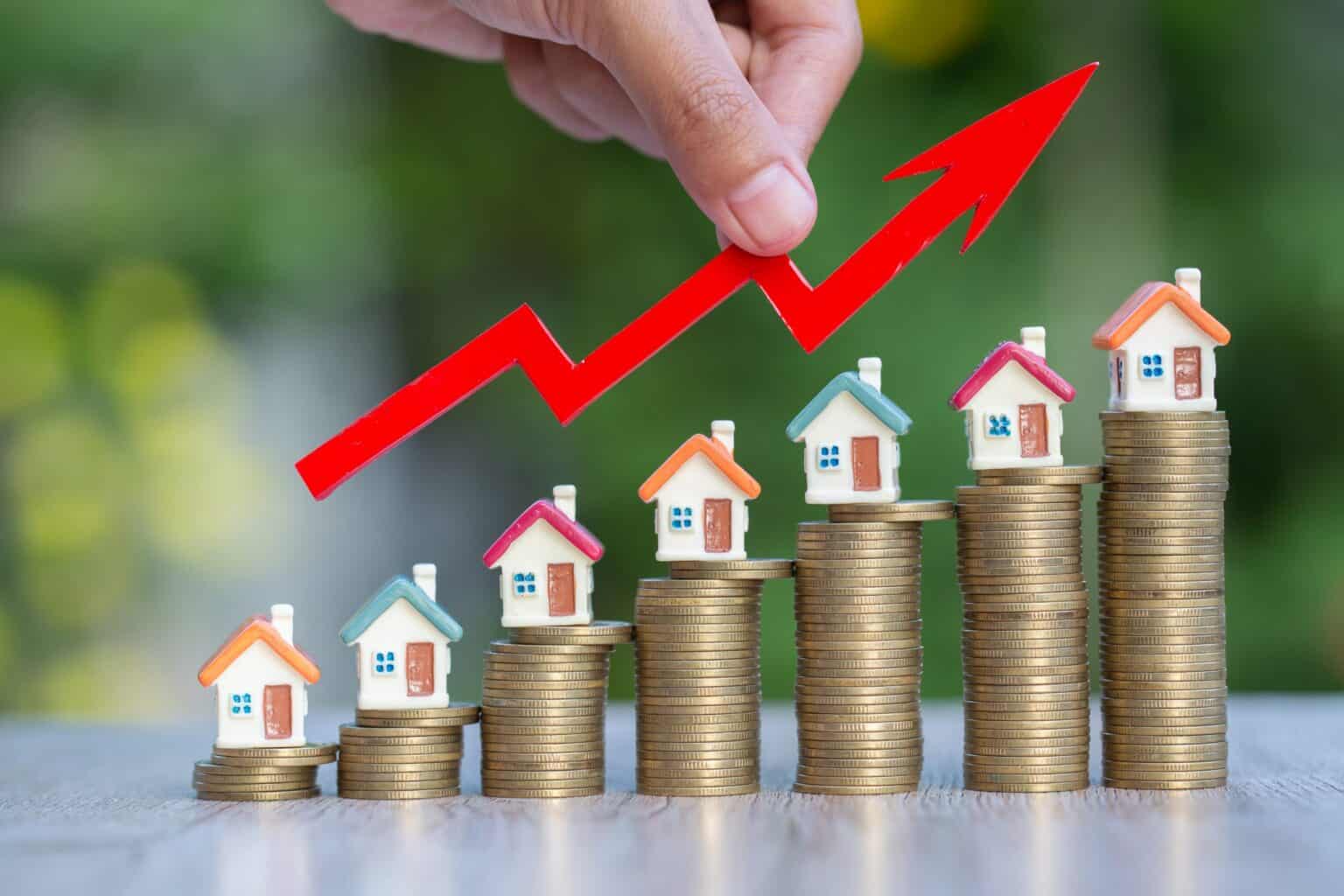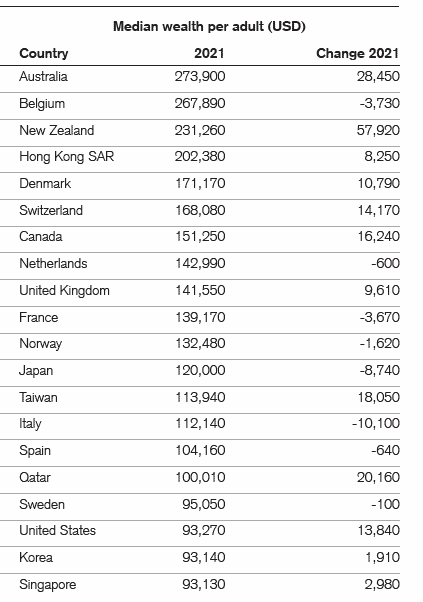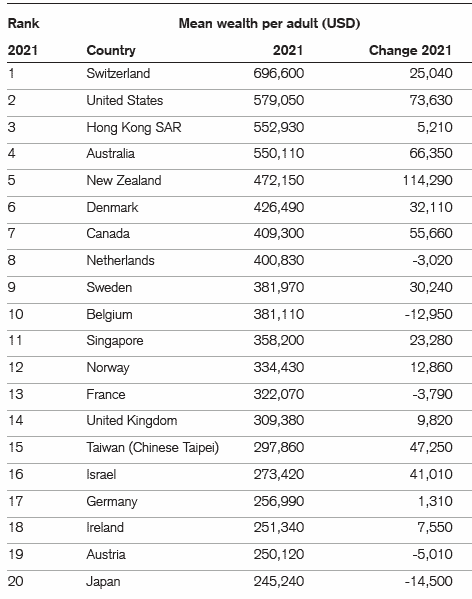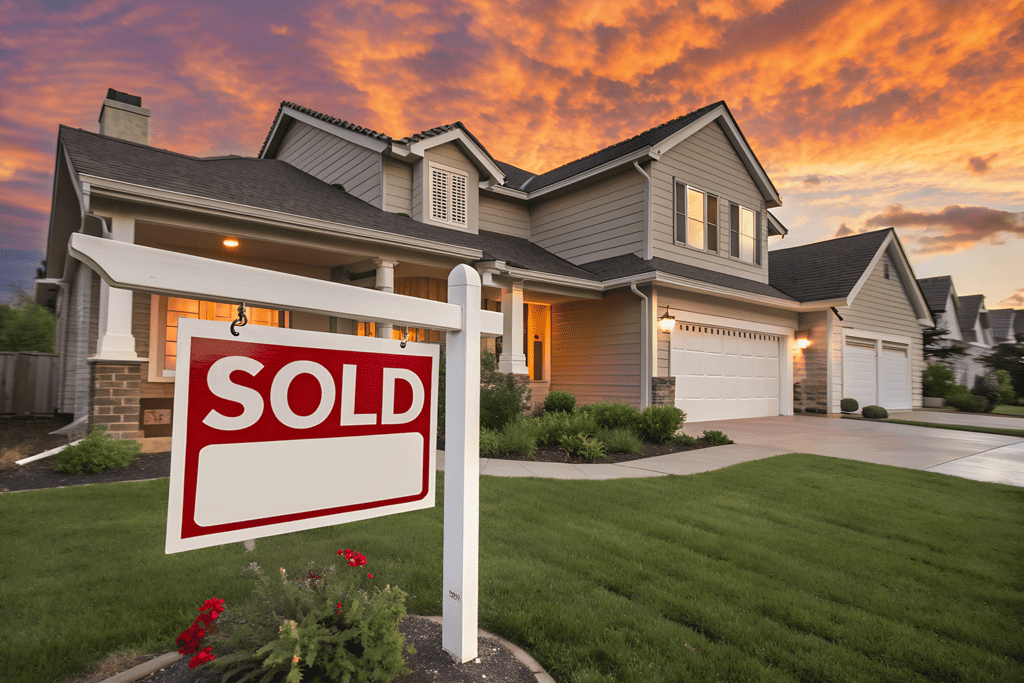Many people in Australia might be grappling with the rapidly rising cost of living. But a new report shows Australians are the wealthiest people in the world as property and share values rose sharply last year.
According to Credit Suisse’s latest global wealth report, the median net worth of an Australian adult increased by US$28,450 to reach more than US$273,000 in 2021. This put Australia ahead of Belgium’s US$267,890 and New Zealand’s US$231,260, which came in second and third in global median wealth.
A major source of Australians’ wealth increase was the record-breaking year for the local property market. National housing values rose more than 22% over the year in the fastest annual growth ever recorded.
Figure 1: Median wealth by country 2021
Source: Credit Suisse, Global Wealth Report 2022
Nevertheless, says Credit Suisse, “The overall composition of assets or wealth has not changed a great deal in Australia since 2000. The share of financial assets in gross assets was 39.5% in the year 2000 and 39.0% at the end of 2021.”
The share market also rose in 2021, with the ASX 200 delivering a total return of 17.2% over the year. Finder’s Consumer Sentiment Tracker found that individual investors earned an average annual return of A$5,356 based on a portfolio of A$31,613.
In terms of mean wealth, the average Australian adult had US$550,110 in 2021 after seeing an annual increase of US$66,350 in their net worth. This put Australia at number four in the world, after Switzerland, the United States and Hong Kong.
Source: Credit Suisse, Global Wealth Report 2022
More millionaires
Soaring asset prices turned 390,000 Australians into millionaires, bringing the total to nearly 2.2 million in 2021. Australia now occupies the eighth spot as a millionaires’ hub, behind the United States, China, Japan, the United Kingdom, France, Germany and Canada.
“Over the next five years, the number of USD millionaires in Australia is expected to increase 35%, from 2.2 million in 2021 to 2.9 million millionaires in 2026,” says Michael Marr, Head of Wealth Management Australia at Credit Suisse.
As the club of highly affluent Australians expands, wealth inequality has also gone up. The richest 1% of Australians held 21.8% of the country’s wealth at the end of last year, increasing from 19.6% in 2007.
“This rise in inequality is in line with the moderate increase in financial assets relative to non-financial assets since the former is less equally distributed,” says the report.
Slower growth ahead
Several factors will likely constrain future growth in wealth, including the falling property market as interest rates continue to rise. Home prices across Australia are forecast to record a peak-to-trough decline of between 15% and 20%. National housing values have so far fallen for four consecutive months, dropping 1.6% in August over July.
“Looking forward, we remain watchful as to the impact of rising inflation [and] the inevitable increase in interest rates, with the knock-on effect on the valuation of the two principal sources of wealth, housing and financial assets, underpinned by GDP [growth],” says Marr.
Australia’s GDP is predicted to grow by 3.25% over 2022, and 1.75% over the next year – lower than the previous forecasts of 4.25% this year, and 2% over 2023.
But Credit Suisse expects wealth around the world to continue rising over the long term.
“Our forecast is that, by 2024, global wealth per adult should pass the US$100,000 threshold and that the [global] number of millionaires will exceed 87 million individuals over the next five years,” says Nannette Hechler-Fayd’herbe, Global Head of Economics & Research at Credit Suisse.






